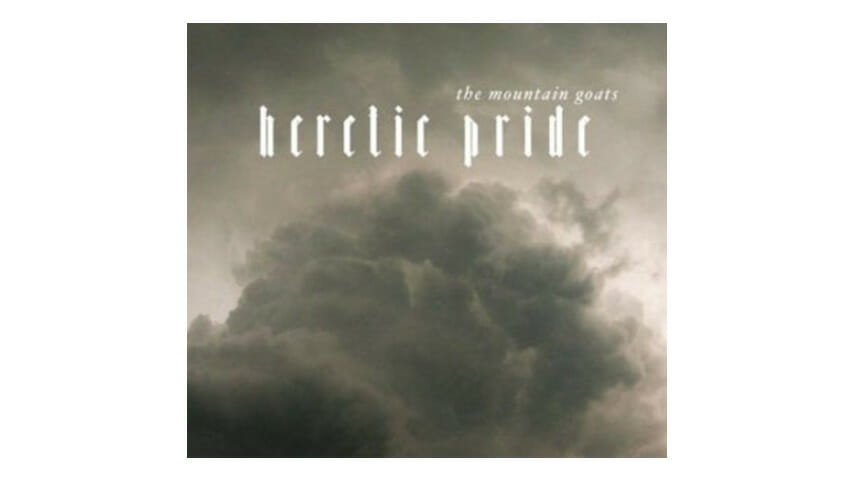The Mountain Goats: Heretic Pride

The Mountain Goats’ John Darnielle is a contrarian by necessity, in the sense that he probably doesn’t know how to be anything else. The mondo literary songwriter’s independent streak has become something of a creative apparatus over his 17-year career, first producing a fiercely underground boombox-recorded canon split between cassettes, 7-inches and compilations, and lately a series of increasingly polished studio recordings for the 4AD label.
The newest, Heretic Pride, follows several albums that might be characterized by one phrase apiece: Florida alcoholics on the verge of divorce (2003’s Tallahassee), Portland speed freaks (2004’s We Shall All Be Healed), the abusive stepfather (2005’s The Sunset Tree) and the sad one (2006’s Get Lonely). Each could be, on first listen, somewhat repulsive to a previous Mountain Goats fan; the sound of Darnielle painting himself into a corner. Usually, though, after repeated plays, Darnielle’s pinched, precise voice had soared triumphant from its seemingly wussy confines to confirm the music’s worth, just as it did when moored by analog hiss. Cellos are the new punk, it seems.
So it is with Heretic Pride, which drops the listener back into the familiar world of Darnielle’s steady collaborators— producer John Vanderslice, bassist Peter Hughes, pianist Franklin Bruno and cellist Erik Friedlander. Darnielle himself is a narrator as instantly recognizable as Raymond Carver or Charles Bukowski, his primary subject being doomed relationships, his primary architectural tool being a strident acoustic guitar. As always, he’s prone to melodrama (“I am coming home to you, with my own blood in my mouth … if it’s the last thing that I do,” he sings on lead track “Sax Rohmer #2”); lush, writerly detail (“when we cracked the windows open, well, the air was just so sweet, we could hear the cars ten feet away, out there on the street,” from “So Desperate”); and unaccountable tenderness (“hand me your hand, let me look into your eyes, as my last chance to feel human begins to vaporize,” on “Autoclave,” the obvious single).
The first few listens reveal familiar questionable choices about the music itself. The literal Jamaican rhythms that punctuate “Sept 15 1983” (about the death of reggae singer Prince Far I, it’s a conceptual companion to 2005’s “Song For Dennis Brown”) seem out of place in the midst of an otherwise normal Darnielle strum. Likewise, the mega-peppy drums behind “Autoclave” and “Heretic Pride” (recalling fellow contrarian Mike Doughty) distract at first with their innocuous sound, as do the big Hammond swells of “New Zion.” Even in his most ornery cassette-era rulemaking, Darnielle was rarely orthodox, employing small keyboards, drum machines and even backing bands when necessary.
-

-

-

-

- Curated Home Page Articles By Test Admin October 21, 2025 | 3:10pm
-

- Curated Home Page Articles By Test Admin October 21, 2025 | 2:57pm
- Urls By Test Admin October 21, 2025 | 2:57pm
- Curated Home Page Articles By Test Admin October 21, 2025 | 2:55pm
-

-

-

-

-

-

-

-

-

-

-

-

-

-

-

-

-

-

-

-

-

-

-

-

-

-

-

-

-

-

-




































